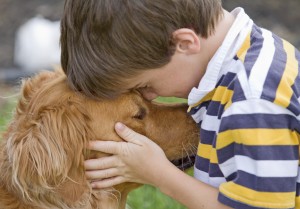Parents of autistic children know how difficult it is at times to manage all of life’s responsibilities, and to care for a child with special needs. Autism has aspects that can make parenting and teaching autistic children that much harder. Many parents are turning to dogs to help their autistic children: dogs can make an autistic child happier, less prone to throw tantrums, and strengthen the child’s sense of security.
Centers have opened in some American cities to specifically train dogs as companions for children with autism spectrum disorders; still other centers that train dogs for special-needs children now also train canines for autistic children.
One couple who got one such dog reported that their autistic son used to frequently wake up during the night and be unable to go back to sleep; one of the parents had to go into the child’s room and stay with him until he fell asleep. This was creating a lot of added difficulty in the family; not only did the parents lose sleep often, but it was also hard to get their son up the next morning, and the boy’s tantrums would become frequent as a result of the child’s own fatigue.
The family got matched with a service dog, which was trained specifically for their son, and the parents later reported that adding the dog to the household brought a big positive change. The boy still wakes up during the night — but now, he pets his dog, who sleeps on the bed beside him, and he is able to go back to sleep without his parents. The child’s tantrums decreased in number, and he is more cooperative with his therapists.
Speech and occupational therapists can in fact integrate a dog into the child’s therapy sessions. An autistic child’s vocabulary often increases after the child gets a dog. Dogs can also improve a child’s behavior and make it easier for him or her to socialize with others.
Dogs can also be trained to do the following:
- Stop child from running impulsively; dog will retrieve child and bring back to caregiver
- Stop mood swings — dog will crawl onto child’s lap to comfort child
- Stop self-harming or other undesired behaviors
- Help find child if child ever takes off
One drawback to getting a dog specially trained for your autistic child is that it can take from 1 to several years to find, train and deliver the dog to the home — not all dogs qualify to undergo the training (and some flunk out of training and a replacement dog has to be found). The special training costs in the tens of thousands of dollars, though some organizations don’t charge parents any money; however, that explains why getting a dog free of charge can take so long.
If you bring a dog into your home and take the dog to training lessons on your own, that can be costly, as well, not to mention time-consuming. But it’s a route that may work for some families.
Can Only Specially Trained Dogs Do Well with Autistic Children?
Not according to a recent small study, which showed that even untrained dogs can be of great benefit to children who have autism. Researchers from the University of Missouri interviewed 70 parents of autistic children. Almost two-thirds of the parents had dogs. Ninety-four percent of parents said that their children had formed a bond with the family dog.
Because autistic children often have difficulty interacting with others, these children can especially benefit from the unconditional, nonjudgmental love and companionship that a dog gives, according to the study’s lead author. The study, published recently in the Journal of Pediatric Nursing, stated that in addition to companionship, a family dog can provide an autistic child with stress relief, and it can be a great opportunity for the child to learn about responsibility.
Speaking of responsibility, parents should keep in mind that bringing a dog into the home is a big step; you should give the matter some thought, to determine if the family will have the time and resources to care for the dog. If you decide that getting a dog is right for your family, the next step is to figure out what kind of dog will work best with your child and your home environment.
Things Parents Should Keep in Mind when Choosing a Dog for Their Autistic Child
- You should get your child involved in choosing the dog; this may help make acquiring the new household member a positive for all
- Some breeds will generally be better than others; a lot of trainers believe that golden retrievers and labrador retrievers make excellent dogs for autistic children, because of these breeds’ calm temperaments and helpful dispositions; however, some autistic children don’t like all the fur in golden retrievers
- Breeds like poodles are good for children who have allergies (these dogs don’t shed as much) or for autistic children who may prefer a soft-coated dog
- Some autistic children will prefer a smaller dog than the retrievers (or standard poodles), as these children find bigger dogs intimidating; these kids may do well with a small, friendly dog
- Learn which dogs your child might like by exposing the child to neighbors’ or relatives’ dogs, or even going to pet stores together
- Get a dog that you, the parent, also enjoy, as you will in all likelihood have to be its caregiver at least some of the time
By Eirian Hallinan

Leave a Reply